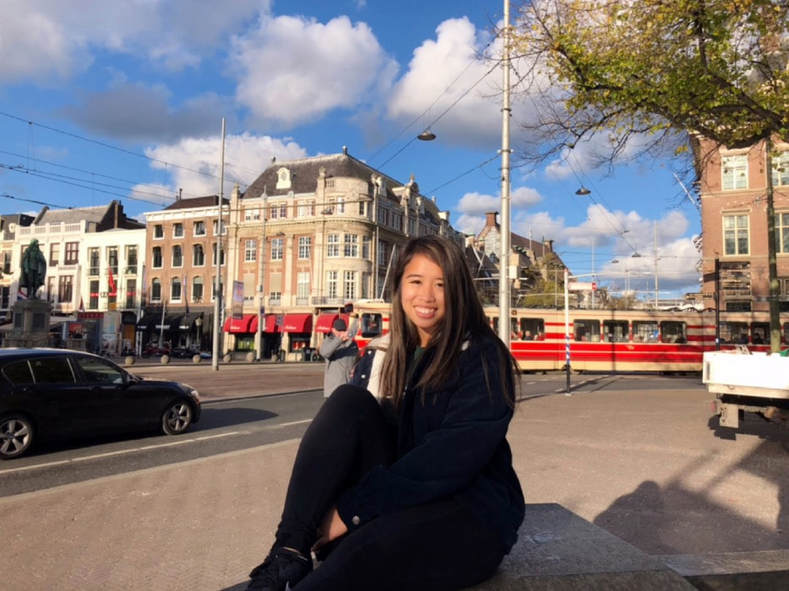|
The Heart2Art Project's Gillian Rule interviewed Sammie Serrano, a 17 year senior in high school living in Huntington Beach, about her experience with her own cultural identity. Here's what she had to say:  Gillian Rule: What is your cultural background? Sammie Serrano: Ethnically, I am Filipino. Both my parents are Filipino. My mom moved from the capital of the Philippines to the states in Cerritos when she was ten years old. She still speaks Tagalog (Filipino language), but she has no accent. My dad grew up in southern California in San Diego, but his parents are from a province in the Philippines called “Batangas.” He used to be able to speak Tagalog when he was really little, but he can only understand it now. However they both grew up in cities where there is a very high concentration of Filipinos, hence they were surrounded by the culture a lot more than I was. GR: What does cultural expression mean to you? SS: To me, it means to feel proud to hail from whatever nationality you were blessed to be, in spite of historical or stereotypical fallacies. It doesn’t necessarily mean wearing traditional clothing all the time as a fashion statement, at least to me (because at least we know that they’re only worn during special occasions like birthdays or weddings). I would personally know what that’s like because the Philippines is currently ruled by a drug cartel overlord trying to deal with an ISIS-inspired terrorist group in the southernmost mainland region. I know that not everyone necessarily knows this since not everyone keeps up with international politics, but it’s still hard knowing that this is the main issue that most political news outlets in the US tend to display. Nonetheless, Filipinos are proud as a culture. We know that whatever anyone thinks of us, only we know how fun it really is to be part of such a communal culture. We wear the Filipino name proudly, even if people are only half Filipino. GR: Have you ever felt out of touch with the culture that you grew up in or identify with? SS: Yeah, mostly because I grew up in Huntington Beach where there’s not really a lot of Filipinos. There was once a small Filipino restaurant in HB, but it didn’t last very long because there’s just not enough Filipinos that live in HB. If you wanted good Filipino food, you would just go anywhere in Cerritos or San Diego, but that’s a bit of a drive. The only times I really felt in touch with my culture was when I was surrounded by other Filipinos at family parties or even shopping at seafood city, the commissary, manila sunset, or other Filipino supermarkets and restaurants where I can recognize the language. Even though I have some friends who happen to be Filipino, it’s funny how the main reason we get along is that we simply are Filipino. Although my mom speaks Tagalog, I never was able to learn the language. I do know some miscellaneous words, but I still wish I was able to speak it fluently. GR: What aspects of your culture do you particularly admire or appreciate? SS: Where do I even start... The most prominent way that we show our love to others is through food. We tend to make a surplus of food for guests because we’re paranoid about having enough for everyone, even if just one person is coming over. I feel most in touch with my culture when I go to any family gathering, because no matter the occasion, whether someone turned a year and a half years old or someone just got engaged or even if someone just died, there’s always going to be a surplus of food waiting for you in the kitchen. At these parties, because we over make so much food, there is literally a word in Tagalog that refers to the leftovers that you’re supposed to take home from the party. We just like taking care of people by making sure they’re well fed. We’re very welcoming and warm to our peers and guests, and that’s why I’ve grown up with such a big and supportive family. Even when I went to the Philippines for the first time in 2017, my favorite part of the mainland was the hometown of grandpa on my mom’s side. Although it was a humble town with lots of rice farms and a small town square, everyone would say “hello” or “good morning” as we were walking by, even if it meant they had to look up and stop whatever they were doing in the rice farms. What I find most hilarious is that Filipinos are always the first ones to make fun of our accents. Out of all the types of puns in the world, Filipino puns are by far my favorite. They can only be understood if you say them out loud because the accent plays into the joke. I just love how we as a culture know how to laugh at ourselves and be the first to make fun of our own accents. GR: Have you ever faced discrimination or disrespect based on the culture you identify with? SS: Not really, or rather not that I can recall. I’ve been mistaken as other races, but I’ve never had anyone comment anything about me based on my actual race. I’ve actually gotten general Asian stereotype remarks since Filipinos identify as Asians, like “you’re Asian you have to be smart.” It shocks me that mostly Asian people have actually come up to me with these comments, and it makes me think that we have possibly taken the unsaid rule that you can make fun of those of your own race a little too far. I know people who have experienced this a little. I remember when the Philippines was a hot topic on news outlets on Snapchat, and my sister's friend sent her a video of Filipinos burning down a statue of Trump and they captioned it “wtf Niki.” It was hilarious to Niki, but that really concerned me because I kept thinking, “So this is what fuels our nationality’s image on the media.” But I know that seeing us in real life is a completely different story than what the internet obsesses over. GR: Has growing up in America affected your relationship with and understanding of your culture? SS: Yup. Y'all don’t know how much I wish I spoke Tagalog so I could understand more jokes. Lol, that's not the actual reason though (but still a big reason). But I do think not knowing the language is a cultural barrier on its own. When I visited the Philippines in 2017, I experienced a culture shock from my own culture. It was everything I expected but also so much more. It was very humbling because the whole idea of “humble” surrounded me. My family stood out so much in the Philippines because although we were Filipino, everyone could tell that we were not from there. GR: How has your culture affected your life as a whole? SS: Most of the impact comes from the life lessons from parents that I know almost any other Filipino would hear from their Filipino parents as well: A clean house is a nice house. Don’t waste food. There are kids starving back home. Laugh. It’s easier than sulking. (My family, in particular, loves to laugh, and I know that having a good laugh is something all Filipinos never take for granted) It could never be that bad (it’s worse in other places) I’ve taken these lessons to heart, and they will always be a part of my life as I grow older. I also think that being Filipino as a whole has taught me to be proud of who I am, just because of how proud we are as a culture, and that really boosted my confidence. GR: What are some changes you would wish to see in the world's cultural tolerance and respect for all cultures? SS: I think the biggest problem when it comes to cultural tolerance is ignorance. With racism, cultural appropriation and other controversial topics along the lines of disrespecting cultures, it’s mostly out of not fully understanding a cultural background. Therefore, I think the biggest aid to that is diversity. I personally love the growing diversity around the world, and I think that’s why people in diverse areas tend to have higher cultural tolerances and knowledge. It’s important to be surrounded by a plethora of cultures and different types of people in order to be exposed and learn to tolerate them. Follow Sammie!
Instagram: @ssammiesserrano
2 Comments
eden cox
12/12/2018 11:42:27 pm
the isis inspired terrorist group caught me off guard 😳
Reply
Elaine Canent
12/13/2018 08:25:49 am
It’s great that you can share your experience of being Pilipino American, Sammie. Your culture has definitely helped shaped you into who you are and how you will continue to grow as you mature! Thanks for sharing!
Reply
Leave a Reply. |

